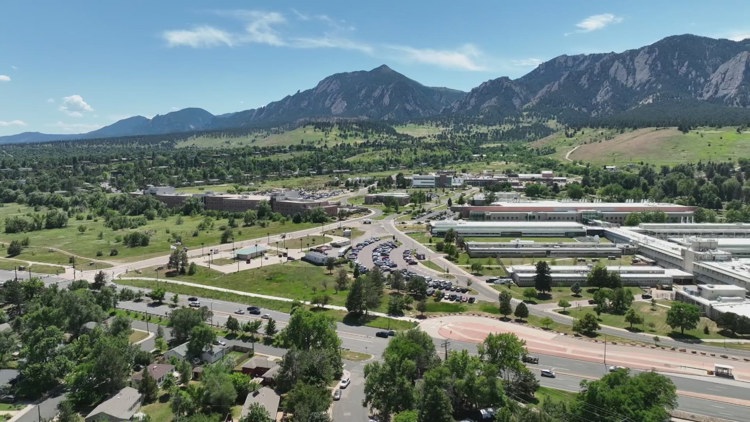Trump Administration's NOAA Plan Slashes Boulder Labs, Endangering 1,000 Colorado Scientists

The Trump administration's proposed budget for the National Oceanic and Atmospheric Administration would eliminate funding for four NOAA research laboratories in Boulder.
If the proposed budget holds, it could potentially result in the layoff of more than 1,000 scientists and researchers in Colorado, according to an assessment by CO-LABS, a group that promotes Colorado's federal laboratories.
The budget proposal requests $0 for the lab in fiscal year 2026 and $0 for full-time employees. The four Boulder NOAA research laboratories, the Chemical Sciences Laboratory, the Global Monitoring Laboratory, the Global Systems Laboratory, and the Physical Sciences Laboratory, which comprise NOAA's Earth Systems Research Laboratory, would be eliminated under the proposal. The budget proposal must be approved by Congress.
CO-LABS executive director Dan Powers characterized the proposed cuts to the labs as dangerous and irresponsible.
"They provide daily the kind of information that we rely on for severe weather details and for ongoing trending weather and environmental information," Powers said.
He added that research conducted at these facilities supports critical industries, including transportation, agriculture, as well as supporting fisheries and utility grid stability.
Economic and scientific impact
The Boulder Chamber says if the proposal is approved as is, it could bring significant potential economic ramifications to the city, too.
"We're deeply concerned," Jon Tayer of the Boulder Chamber said. "The federal labs here are a very strong point of pride for us as well as an incredibly important element of our economic vitality."
The threatened cuts extend beyond direct NOAA employees to include researchers who are part of the Cooperative Institute between NOAA, the University of Colorado Boulder, and Colorado State University. The decades-old collaborations between research universities and NOAA collectively employ hundreds of scientists.
Tayer emphasized that federal research laboratories, and the employees who work there, are crucial to Boulder's identity.
"They are the foundation of our economy," he said, adding that creating scientific discoveries that become business enterprises fuels the community's entrepreneurial startup ecosystem.
Former official calls cuts 'unconscionable'
Craig McLean, former assistant administrator of NOAA Research, said the budget cuts to the Boulder labs are gutting and debilitating, but not unexpected. He delivered a scathing assessment of the proposal and the Trump administration's actions directing NOAA.
"It's profound, crass, vindictive, and I'll say even stupidity, that's being exacted by this administration on the science of the nation," McLean said. "It's clearly an attack on climate science."
He added it's part of a broader pattern of disassembling and destroying the climate expertise that exists in the United States government. McLean said the research in the NOAA labs is essential not only for citizens and communities but for entire industries that depend on climate and weather forecasting.
"My mortgage rate depends upon what the potential of climate impact will be in my neighborhood, what the sea level rise will be, why and when? All of that is calculated, assessed, and forecast by NOAA," McLean explained. He noted that transportation, building, finance, banking, agriculture, and fishing sectors all rely on NOAA's Boulder research.
Loss in the science industry
Powers agreed that eliminating the research capabilities would have a widespread impact on the public.
"It's an existential threat to our country's capacity to be able to predict weather and predict severe weather," he said. Powers is concerned that younger scientists could leave the country to help international competitors.
"The idea that we would give them up because we don't want to know what they will discover is irresponsible, to say the least," Powers said. "Our competitors around the globe are happy to continue running the race and understanding things that we've decided, apparently, we don't want to know."
Data gap concerns
The CO-LABS representative questioned the logic of the cuts, pointing out that denying climate science doesn't make it go away.
Both Powers and McLean emphasized that even if a future administration were to restore funding, the temporary shutdown would create irreparable damage to scientific research.
"The greatest harm would be the data gap and what might have been missed during the course of the cessation of recording these numbers," McLean said. "By having a hiatus, perhaps during the period of this Trump presidency, and then restored and rebuilt thereafter, will constitute a gap in the data record which is compromising for the thoroughness of our understanding of what is happening in the world."
Boulder's scientific legacy at risk
McLean, who lives on the East Coast, described the Boulder labs as "a gem" and "a monumental national asset," known in the science community for quality research and innovation.
"The importance of the work there is paramount in defining and measuring the changes in our atmosphere, the changes in climate, and being able to deliver to the public what the future will look like," McLean said.
He warned that eliminating Boulder's research capabilities would leave the nation unable to measure atmospheric changes in the future.
"If we take Boulder away, we don't know what the future is going to look like," he said. "You can't stop measuring our atmosphere."
NOAA provided a statement to 9NEWS, which says, "NOAA remains dedicated to its mission, providing timely information, research, and resources that serve the American public and ensure our nation’s environmental and economic resilience."
Post a Comment for "Trump Administration's NOAA Plan Slashes Boulder Labs, Endangering 1,000 Colorado Scientists"
Post a Comment